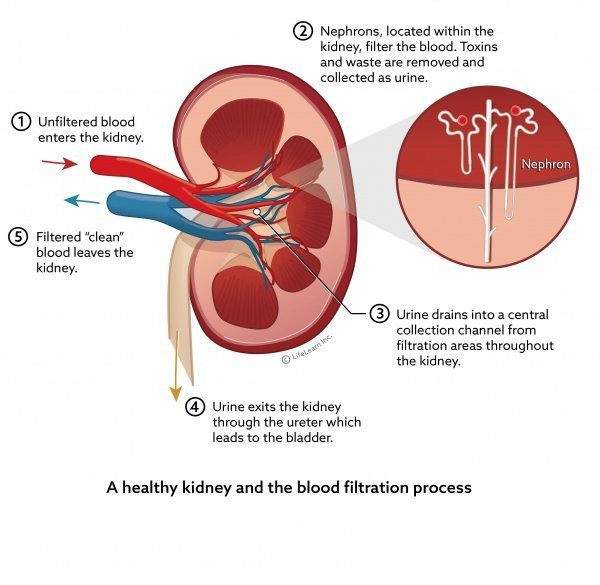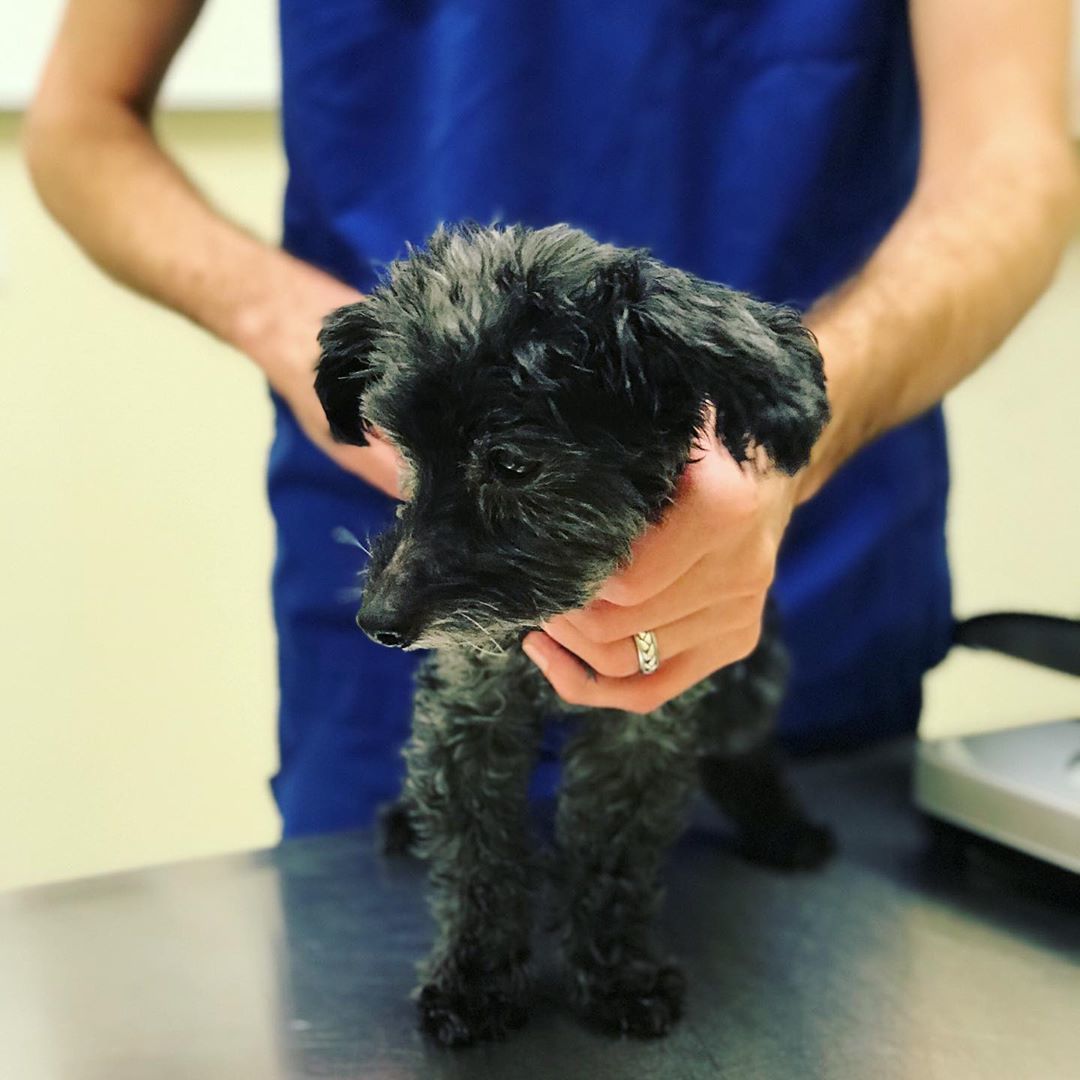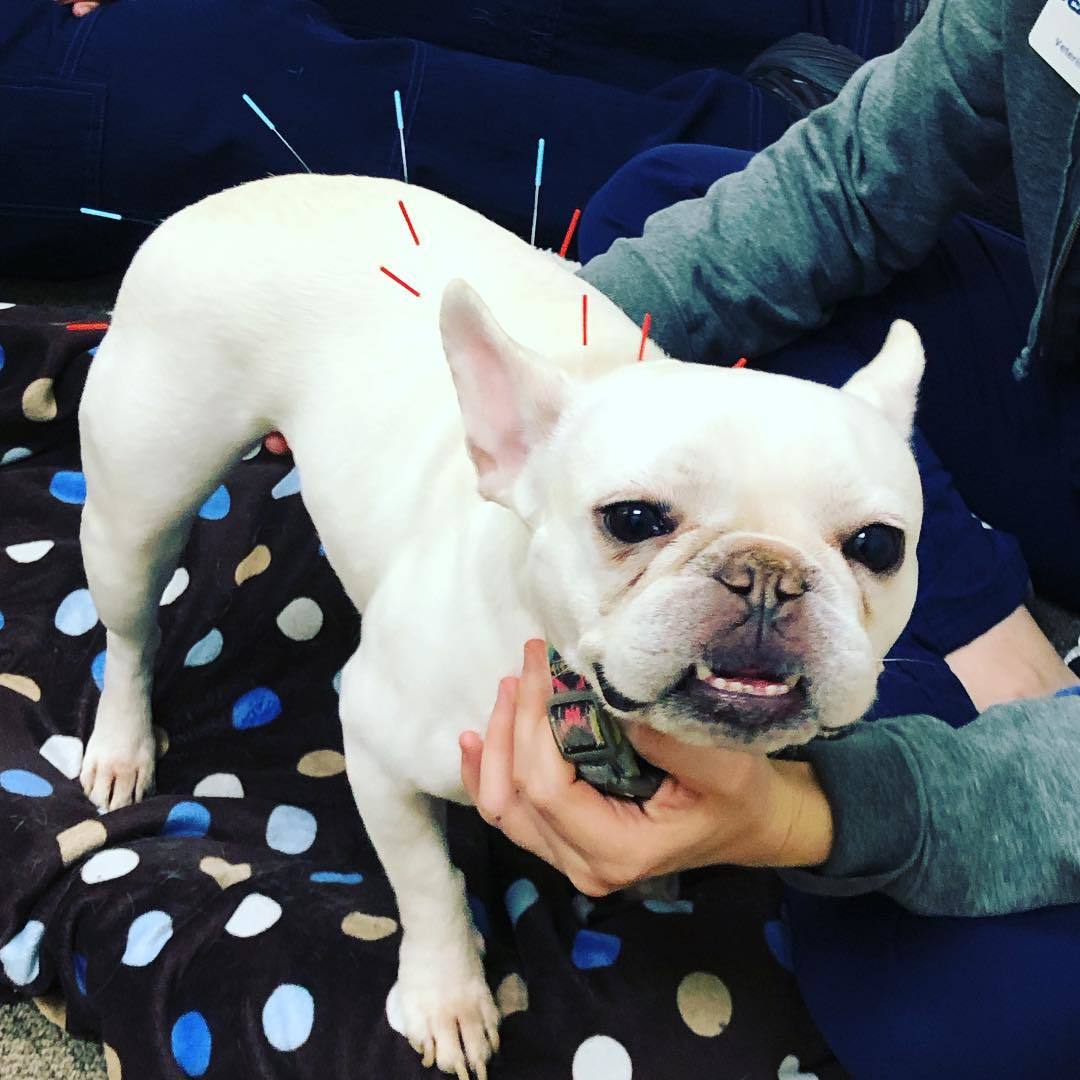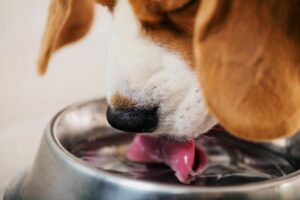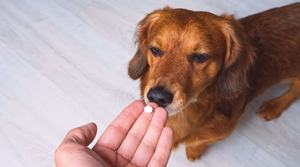
Reviewed & Fact-Checked by
Dr. Chyrle Bonk
Veterinarian (DVM)
Learn more about our Veterinary Review Board »
As is the case for humans, a dog's kidneys have crucial functions to perform every day.
They must remove waste from the body, help make red blood cells, control the body's pH levels and the kidneys even have a role to play in bone health.
Unfortunately, just like humans, these vital organs can stop working properly, leading to kidney failure in dogs.
Also read: The best dog food for kidney disease
What is Kidney Failure in Dogs?
The medical definition of kidney failure in dogs is when their kidneys can no longer process and remove waste products from the blood.
Chronic kidney disease, which often precedes kidney failure, is a progressive loss of proper kidney function over a period of time.
While chronic kidney disease is often the cause of kidney failure in dogs that is not always the case. In some cases, sudden, or acute, kidney failure can occur as a result of a stimulating factor like the ingestion of a toxic substance.
Chronic kidney disease is defined as kidney disease that has been present for longer than three months. Chronic renal disease (CRD), chronic renal failure (CRF), and chronic renal insufficiency refer to the same condition.
What Causes Kidney Failure in Dogs?
The most common cause of chronic kidney failure in dogs is simple aging, as in very basic terms the kidneys begin to wear out. If this happens, symptoms often begin in smaller pups around the age of 12-14 years.
For bigger dogs however, kidney failure can manifest itself much earlier, at as young as seven to eight years old.
Another, more recently discovered cause of chronic kidney failure in dogs is dental disease. A number of large studies conducted worldwide have found that bacteria that is the result of advanced dental disease in dogs can enter the bloodstream and begin to attack multiple vital organs including the kidneys, liver and heart.

“The bacteria in the oral cavity of a pet with periodontal disease can be released into the circulatory system and travel throughout the body. This can cause damage to cardiac tissue and lead to endocarditis.
When bacteria invades kidneys, it damages glomerulus membranes, causing them to function improperly. Bacteria also can cause functional changes in the liver of dogs.
Because of periodontal disease's affect on overall health, it's more than a localized problem that leads to bad breath and tooth loss-it's also the beginning of more severe systemic issues.”
- Mary L. Berg, BS, RVT, RLATG, VTS (dentistry) -
Acute kidney failure in dogs can be caused by a number of things.
The ingestion of household toxins, especially antifreeze can cause acute kidney failure as can certain medications and eating tainted food.
An aggressive untreated UTI can sometimes cause acute kidney failure as well.
How Can I Tell if My Dog is Suffering from Kidney Failure?
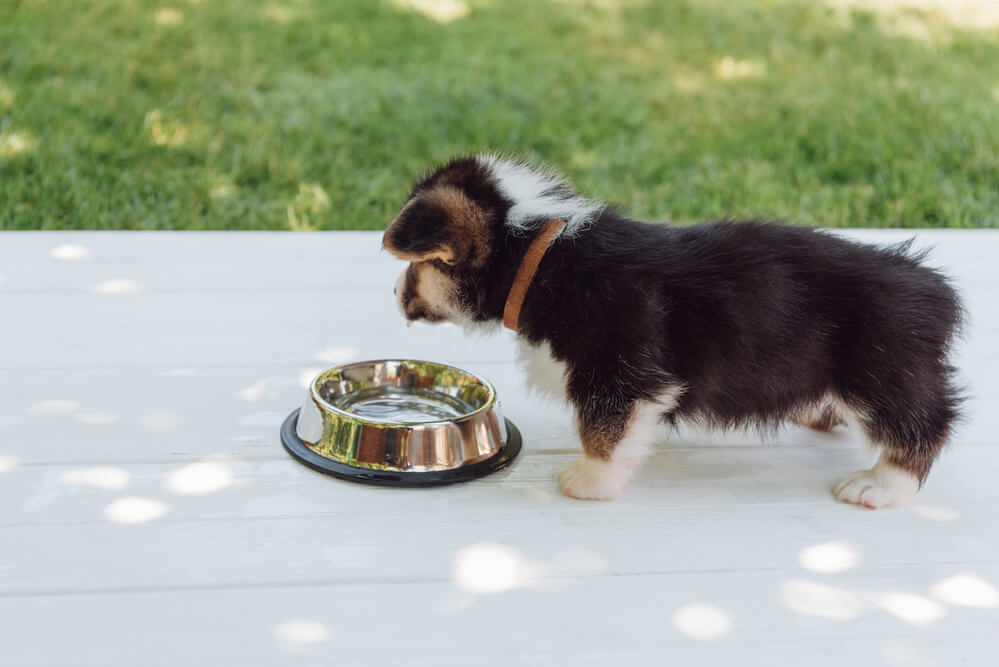
Some of the first signs of chronic kidney failure in dogs are increased thirst and increased urination. This occurs because the kidneys can no longer concentrate urine. Dogs will produce excessive amounts of very dilute urine, but they will have difficulty flushing toxins from the body.
To prevent dehydration, the body triggers a thirst response prompting a dog to drink more water more often.
If you notice this in your pup you should consult with a vet as soon as possible so that his kidney function can be accessed. Early treatment can make a difference.
In the case of acute kidney failure, or in advanced stages of chronic kidney disease that are leading to end stage renal failure you may also notice the following symptoms:
If you see your pup display any of these symptoms you should get him to his vet as soon as possible.
How is Kidney Failure Diagnosed?
After a thorough examination to determine your pup's current state of health, his vet will order blood tests that will be used to determine the level of two things in his bloodstream; blood creatinine and blood urea nitrogen, more commonly referred to as BUN.
A urinalysis will also be ordered to determine the current level of kidney function.
The International Renal Interest Society (IRIS) has proposed a 4 tier system for staging CKD in dogs (and cats). Stages are numbered 1 through 4 where one is the least severe and four is the most severe. The higher the stage number also generally corresponds to the greater number of symptoms seen in the pet and the poorer the prognosis.
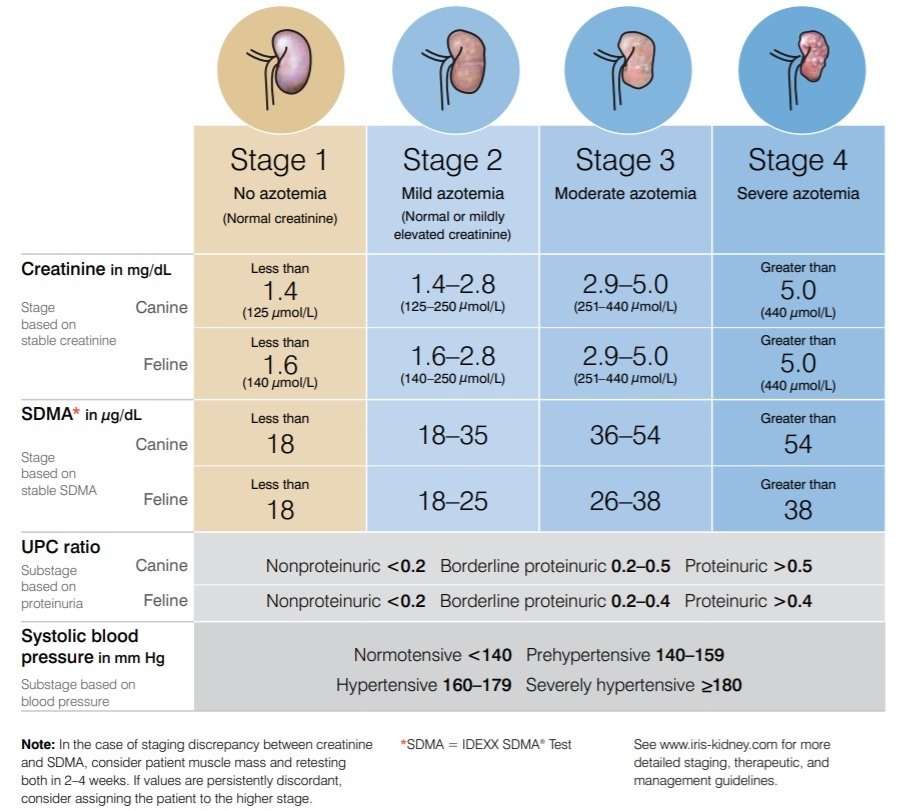
IRIS Stages of CKD in dogs. Image via IRIS
Your vet will also look for signs of dehydration, weight loss, pale gums and ulcers in the mouth.
Other tests your vet may perform, depending on the severity, include:
1. Abdominal radiographs (x-rays) or ultrasound to determine kidney size.
2. A kidney biopsy to show the underlying cause for the kidney failure. A test of clotting ability may also be performed ahead of the biopsy to ensure your pet's ability to stop the bleeding from the biopsy site.
3. Bacterial culture to examine if a bacterial infection is present.
How is kidney failure in dogs treated?
Kidneys do not regenerate like the liver, so treatment is aimed more at managing the disease to prevent future deterioration. In some cases, kidney failure in dogs cannot be treated at all, as they are simply worn out and cannot be 'restarted'.
This may occur if the pup was severely poisoned or if their kidney disease was in an advanced stage but it went unnoticed.
For other pups though treatment can be attempted. It is often complex and long term but it may extend their life by several months to several years.
The goal of treatment for kidney failure in dogs is two-fold. The immediate action is to flush out the body to remove toxins and the next phase is to help increase kidney function in the case of mild to moderate acute renal disease or to maintain it with more severe or chronic conditions.
Treating Acute Renal Failure in Dogs
To flush out the kidneys and remove accumulated waste IV fluids are given in large quantities. This process is called diuresis and the aim is to flush away toxins and to stimulate the pup's own kidney cells to function again.
If there is enough healthy tissue remaining, kidneys may be able to functionally remove waste and prevent dehydration on their own.
In the case of chronic renal failure or several acute renal failure, there may not be enough healthy tissue left to function without repeated fluid administration and supportive care.
As the IV diuresis proceeds your pup may also be given electrolytes to replace those that have been lost, drugs to prevent further vomiting or diarrhea and vitamins to boost overall health.
There are usually three things that can happen as a result of this initial phase of treatment for kidney failure in dogs:
1. Your pup's kidneys will resume functioning by themselves and will continue to do so for anywhere between a few weeks and a few years.
2. The kidneys will function again while the diuresis continues but fail when it stops.
3. The kidneys will not function again at all and euthanasia is likely to be advised.
Unfortunately as the treatment begins there is no reliable way to predict the outcome and every pup will likely have a different experience during treatment.
Ongoing Treatment for Kidney Failure in Dogs
If a pup makes it through the initial stages of treatment and kidney function is restored they cannot be considered 'cured'. Their kidneys have still sustained damage and will never be considered to have 'normal' function again.
To help them live as long as possible their treatment will need to continue, both at home and with regular visits to their vet.
A long term treatment plan is likely to include the following:
Maintain a renal therapeutic diet

Diet can play a huge role in extending the function of your pup's kidneys after renal failure. The best diet for them will be one that is low in protein, is not acidified and has very low levels of the mineral phosphorus.
Protein: The recommended range of protein on a dry matter basis for dogs with CKD is less than or equal to 14-20%.
Phosphorus: The recommended phosphorus range on a dry matter basis for dogs with CKD is 0.2-0.5%.
Sodium: Low sodium levels (≤ 0.3%) are preferable in order to reduce the workload on the kidneys. Kidney diets usually have less sodium than regular diets.
Omega-3 fatty acids: Dietary omega-3 fatty acids are anti-inflammatory and may slow the decline in kidney function.
Your pup will also probably need to be given a daily potassium supplement.
Potassium levels: tend to decline in dogs with kidney failure, making supplementation often necessary. If not, muscle function, including heart muscle, can be affected.
Dogs are also likely to be given a medication called a phosphate binder. When kidney function is decreased potentially harmful phosphates build up in the body. These drugs bind to them to stop them being absorbed into the bloodstream and carry them out of the body.
Here's a quick summary of all the key components recommended on a dry matter basis a kidney support diet for dogs with CKD should contain:
Protein | 14-20% |
Phosphorus | 0.2 - 0.5% |
Sodium | ≤ 0.3% |
Omega-3 fatty acids | 0.4 - 2.5% |
A diet that meets these guidelines will decrease the workload placed on your pup's kidneys helping them function longer. Usually your vet will recommend a renal therapeutic formula for them to eat on a daily basis and advise that they not be given any human food at all.
When making diet changes it helps to gradually introduce the new diet your pet by adding increasing amounts of the new diet while reducing the amount of the current diet over 1 to 2 weeks.
There are many pet food companies that sell kidney diets, including online retailers such as Amazon.com or Chewy.com. A veterinary prescription is required for most renal diets.
Your veterinarian will help you choose an appropriate formulation for your dog.
Subcutaneous Fluid Treatment
It is likely that once your pup is home and has started on his special diet that you will be advised to give him a subcutaneous fluid treatment on a regular basis to help him flush his system and prevent dehydration.
This is done by injecting fluids under the skin. While it may be scary to many pet parents at first, most find that they learn how to do it faster than they imagined and most pups tolerate it quite well
An alternative to this that is considered for some canine patients is kidney dialysis. This process is almost the same as the dialysis treatments that human kidney disease patients have been receiving for decades.
The treatment usually calls for a pup to visit a dialysis center three times a week for several hours. It is not hugely successful in dogs with chronic kidney failure but for dogs who are younger and suffered acute kidney failure due to poisoning it can be more effective.
Additional Medications
Depending on the original severity of the renal and their current condition, a pup may also be prescribed a number of other drugs to help maintain kidney function longer.
These may include the following:
An antacid: Some studies have shown by reducing stomach acid and nausea in dogs with kidney failure, you can increase appetite.
A drug to regulate calcium levels: With kidney failure, calcium regulation becomes more difficult. In order to maintain the proper calcium/phosphorus balance in the blood, a calcium supplement may be necessary.
A high blood pressure drug: The kidneys help regulate blood pressure, so kidney failure can lead to a higher blood pressure. Medication to lower and stabilize their blood pressure is often prescribed.
A drug to stimulate red blood cell growth: Red blood cell growth often slows in dogs who have kidney problems and so your pup may be given medication to stimulate greater red blood cell growth and prevent complications caused by anemia.
Acupuncture
Although it is not a traditional medical treatment some vets - and pet parents - have found that acupuncture helps pups with reduced kidney function.
There are an increasing number of canine acupuncturists offering these treatments and is something you may want to try.
Cost Treating Kidney Failure in Dogs
As you may have realized by now the cost of treating kidney failure in dogs can be very high, especially if they are provided with long term treatment.
There is no one figure - or even set of figures - that can be offered to accurately estimate the cost of treating a pup with kidney failure or chronic kidney disease, as there are so many variables involved.
The most expensive treatment of all would be a kidney transplant. The limited number of surgical centers offering kidney transplants for dogs charge between $10,000 and $15,000 for the procedure and that does not include aftercare and medication costs.
Some of the costs of more conventional treatment for kidney failure in dogs can be more manageable but still quite high. Dialysis is expensive - usually $2,500 to $3,000 for the first week and $500 for every treatment after that.
Home based subcutaneous fluid treatment, if your pup is a good candidate is far more affordable, at about $40-$60 per week, which is the cost of the IV fluid itself and the supplies needed to administer it.
Medication costs will vary, depending on how many the pup needs to take and how often. The costs are sometimes able to be lowered if pet parents choose to fill their dog's prescriptions through an online pet pharmacy rather than at the vet's pharmacy.
The cost of a special diet will also vary depending on the food chosen and whether it needs a prescription to be written for you to purchase it.
As you can see, the costs of treating kidney failure in dogs can indeed be high.
Some pet insurance policies will help offset many of these costs (provided kidney failure was not a pre- existing condition when the pet was enrolled in the program).
Kidney Failure Recovery, Prognosis and Prevention
It is not easy to predict how well a dog will recover or how long they'll live after having experienced kidney failure.
Very much will depend on how quickly the problem was treated, how much permanent damage was done to the kidneys and how well the pup responds to treatment.
In the best case scenarios, when a pup is younger, damage was mild, short term treatment was prompt and long term treatment is relatively successful they may live for up to an additional five years.
Many pet parents wonder what they might be able to do to prevent kidney failure in their pup.
To prevent acute kidney failure due to poisoning, keep all household chemicals well out of your pup's reach, and see that he is always supervised outside where such things might be being used.
You should be especially careful to keep your dog away from antifreeze.
Taking better care of your dog's dental health is increasingly believed to be a way to help prevent chronic kidney disease and kidney failure.
Their teeth should be brushed at home on a daily basis and they should get a professional dental cleaning at their vet's office once every six months.
Some people often wonder if nutrition has a role to play in preventing kidney failure in dogs as well. This, like many other aspects of canine nutrition and health is still something that is a matter of serious debate, both among veterinary medicine professionals and pet parents.
Most experts agree however that the best thing to do is ensure that your dog eats a healthy, balanced diet from early in life and that they always have access to fresh, clean water at all times.
Finally...
Kidney failure in dogs is a very serious matter and should always be treated as such.
If you notice any sign that your pup may be experiencing kidney problems getting them treated as quickly as possible is a must.
If, for example, they are drinking more and urinating more, have them checked out. It may not be related to kidney issues at all, but as those are the earliest warning signs of kidney failure prompt treatment may make a big difference.

